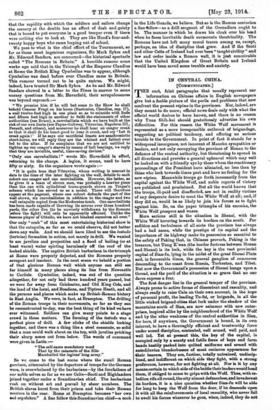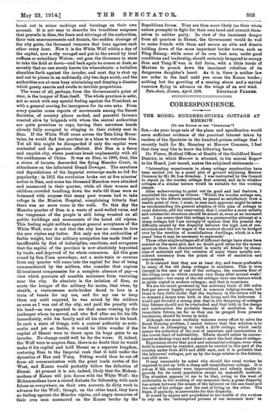IN CENTRAL CHINA.
[COMMUNICATED.]
Tntcurt, faint paragraphs that usually represent our formation on Chinese affairs in English newspapers give but a feeble picture of the perils and problems that now confront the present regime in the provinces. Nor, indeed, are they meant to do more; official news deals only with what the official world desires to have known, and there is no reason why Yuan Shih-kai should gratuitously advertise his own difficulties. For this reason the White Wolf movement is represented as a mere irresponsible outbreak of brigandage, suggesting no political tendency, and offering no serious trouble to the Government. In point of fact it stands for a. widespread insurgence, not innocent of Manchu sympathies or leaders, and not only occupying the province of Ronan to the defiance of the central authority, but threatening to spread in all directions and proioke a general upheaval which may well be looked on with a friendly eye by those whom the reactionary proceedings of the President have alienated, no less than by those who look towards times past and have no feeling for the new regime. Meanwhile troops go forth incessantly from the capital against the White Wolf, and noble reports of victory are published and proclaimed. But all the world knows that the troops, ill-paid and disaffected, are not in reality victims of any desperate desire to meet the White Wolf at all; and, if they did so, would be as likely to join his forces as to fight against him. So, on the paper triumphs of his enemies, the White Wolf prospers and waxes.
More serious still is the situation in Shensi, with the White Wolf hovering towards its borders on the south. For sedition and turbulence of all sorts the province has always had a bad name, while the prestige of its capital and the importance of its highway make its possession so essential to the safety of Peking that, in Chinese proverb, Peking is the treasure, but Tung K'vran (the border fortress between Hunan and Shensi) is its lock, while the key is the vast provincial capital of Sian-f u, lying in the midst of the great Shensi Plain and, in favourable times, the general ganglion of commerce descending to the coast from Russia, Turkestan, and Tibet. But now the Government's possession of Shensi hangs upon a thread, and the peril of the situation is so grave that no one dares express a fear.
The first danger lies in the general temper of the province. Always prone to active forms of discontent and rascality, and always ready to raise Cain on their own account, in the hope of personal profit, the leading Tu-fei, or brigands, in all the little wicked brigand-cities that lurk under the shadow of the mountains south of Sian, are now aaimmer with new enter- prises, inspired alike by the neighbourhood of the White Wolf and by the utter weakness of the central authorities in Sian, for here, if anywhere, the Government is bound, in its own interest, to have a thoroughly efficient and trustworthy force under sound discipline, contented, well armed, well paid, and well led. Yet at present this, the key of the capital, is occupied only by a scanty and futile force of boys and farm hands hastily packed into quilted uniforms and armed with antediluvian blunderbusses of most ominous appearance for their bearers. They are, further, totally untrained, undiscip- lined, and indifferent on which aide they fight, with a strong preference, however, for not fighting at all. Nor is it by any means certain to which side of the battle theirleaders would head them, if obliged to come to gripe with the Wolf. Thus, with re- bellion rife all round, the city almost defenceless, and invaders at its borders, it is a nice question whether Sian-fu will be able for long to keep the Wolf from the door, if he descends upon it with all the reinforcements of local rascality, who never fail to swell his forces wherever he goes, when, indeed, they do not
break out in minor sackinge and burnings on their own account. It is not easy to describe the breathless suspense that prevails in Sian, the fears and stirrings of the authorities, their vain announcements and denials, the sudden closings of the city gates, the thousand rumours that buzz against each other every hoar. Now it is the White Wolf within a day of the capital, now a city ravaged and pat to the sword by local ruffians or subsidiary Wolves: out goes the Governor in state to take the field at dawn—and back again he comes at dusk, so secretly that no one surely knows his whereabouts : a battalion shambles forth against the invader, and next day is shut up and cut to pieces in an unfriendly city two days south, and the authorities are at once busy minimizing and denying a disaster which gossip asserts and swells to terrible proportions.
The worse of all, perhaps, from the Government's point of view, is the temper of Sian itself. The whole province is astir, not so much with any special feeling against the President, as with a general craving for insurgence for its own sake. From every quarter come reports of movements among the Secret Societies, of country places sacked, and peaceful farmers roasted alive by brigands with whom the central authorities are quite powerless to cope, having their nerveless hands already fully occupied in clinging to their rickety seat in Sian. If the White Wolf came across the Tain-Ling Moun- tains, he would find the province in a blaze to welcome him. Yet all this might be disregarded if only the capital were contented and its garrison efficient. But Sian is a fierce and unquiet city, where passions break unpleasantly with all the suddenness of China. It was on Sian, in 1900, that, like a storm of locusts, descended the flying Manchu Court, in attendance on the infuriated Grand Dowager. The exactions and depredations of the Imperial entourage made no bid for popularity : in 1911 the revolution broke out at five minutes' notice in Sian, and some ten thousand Manchus were attacked and massacred in their quarter, while all their women and children crowded headlong down the wells till these were so brimmed with corpses that many poor women had to take refuge in the Mission Hospital, complaining bitterly that there was no more room in the wells. To this day the Manchu quarter of Sian is a waste of mud-walled ruins, and the vengeance of the people is still being wreaked on all public buildings and monuments of the hated old regime. This feeling might militate against general acceptance of the White Wolf, were it not that the city has no reason to love the new regime any better. Not only are the authorities of feeble weight, but the military occupation has made itself so insufferable by dint of indiscipline, exactions, and arrogance that the capital of the province is now absolutely boycotted by trade, and deprived of its whole commerce. All this goes round by San-Yuen nowadays ; not a mule-train or caravan from any quarter will come into the capital for fear of being commandeered by the soldiers, who consider that copious ill-treatment compensates for a complete absence of pay—a view which prevents all sensible muleteers from venturing near the city. So absolute is the isolation of Sian, so acute the hunger of the military for mules, that when, by stealth, a venturesome mule-broker dared to lure in a train of beasts for my use, and for my use to keep them coy until required, he was seized by the soldiers as soon as I was out of the city, and paid the penalty with his head—as was reported to me that same evening by the innkeeper whom he nerved, and who fled after me for his life immediately, with his family and all his chattels in his hand. In such a state of things, with a central authority so auto- cratic and yet so feeble, it would be little wonder if the capital of Shensi were to throw open its huge gates to an invader. No change could well be for the worse. If, indeed, the Wolf were to acquire Sian, there is no doubt that he would make it his capital and hold Shensi as a separate kingdom, restoring Sian to the Imperial rank that it held under the dynasties of Han and T'ang. Peking would thus be out off from all communication with the great trade routes of the West, and Kaman would probably follow the defection of Shensi. At present it is not, indeed, likely that the Moham- medans of Kansu will join forces with the White Wolf the Mohammedans have a rooted distaste for fellowship with such felons as everywhere, on their own account, do dirty work in advance for the Wolf ; though, on the other hand, they have no feeling against the Manchu regime, and angry memories of their own men massacred on the Kamm border by the Republican forces. They are thus more likely (as their whole nature prompts) to fight for their own hand and commit them- selves to neither party. In view of the imminent danger from all quarters in Shensi, the Government would do well to make friends with them and secure an able and draetio holding down of the more important border towns, such as Fang Hsiang: while some of its own best men, under good conditions and leadership, should certainly be spared to occupy Sian and Tung-K'wan in full force, with a little horde of Maxims to preach down the imminent rebellion of its dangerous daughter's heart. As it is, there is neither law nor order in the land until you cross the Kansu border; nothing but the growling of a coming storm and a myriad rumours flying in advance on the wings of an evil wind.
TAW-chow, Kansu, April 12th. RICOINA.LD PALERMO..















































 Previous page
Previous page